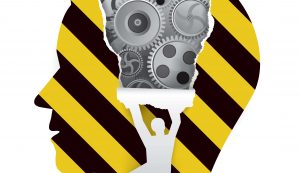Better mental health is business wealth

People are a company’s most important asset, which is why it is crucial to invest in their happiness. According to figures from St. John Ambulance research, 30% of business costs could be saved through higher investment in wellbeing, a figure which shouldn’t be surprising considering two out of five workers have taken a period off work due to poor mental health.
With the Covid-19 pandemic undoubtedly a further burden on the minds of many, which measures can be taken to ensure businesses provide the support to those where it matters most?
Mental health: how far have we reached?
The issue of mental health has come a long way over the past decade. Its stigma has gradually been dismantled by improved awareness around the complexity of the illness and how significantly people can suffer. Key spokespeople in the form of influencers and celebrities have also brought the illness into the public consciousness, to open-up essential discussion on the ‘silent killer’.
Yet in some places of work mental health is still something of a taboo subject. This can be for many reasons including the absence of the correct infrastructure to really understand the picture of poor mental health.
The construction industry in particular is still struggling with how it talks about mental health, with figures from insurance company AXA’s ‘2018 Stress Index’ highlighting 82% of workers in building and construction experienced stress during working and non-working hours in the week.
One of the steps towards dealing with mental health in construction is acknowledging the industry can be a tough environment to inhabit for anyone, regardless of which state their mental health is in. Worrying levels of stress can be a consequence of tight project deadlines, long working hours and physical exertion. Deadlines need to be met on a daily basis to satisfy a seemingly never-ending chain of command that begins with the client, but can include a host of contractors and various trades which are dependent on a person a lot further down the line getting their bit right for a project to proceed at sufficient speed. Sometimes it isn’t a single stressor which impacts mental health; these things can mount up without us really being aware of how we are doing, only to hit us when we are really at our most vulnerable.
For the sake of its employees, the industry would do well to see how it can offer better support to those suffering. According to another figure from the St. John Ambulance research, 300,000 people with long-term mental health lose their jobs each year. Without a stable income and a sense of ‘normality’ which a typical 9-5 working day brings, how is their mental health supposed to improve? We must also ask the heavy question as to whether efficient measures were implemented by their employers. Was support made available to them? And if so, was it sufficient enough?
Combatting mental health in construction will mean the industry has to make important decisions. Mental health must be dealt with transparently, realistically and sensitively, filtering down from senior management to the general workforce.
Thankfully, the construction industry is gradually becoming aware of the health issues in its midst. Initiatives such as Mates in Mind, a recently-launched charitable programme designed to improve and promote positive mental health in construction, has the backing of the British Safety Council, the Health in Construction Leadership Group, and the Samaritans, and is going some way to guide the industry in the right direction when it comes to mental health.
Which steps is HAKI UK taking?
As an employer and a business HAKI understands mental health is of paramount importance. It is why we are committed to continually reviewing the way we support our workers, to ensure they are happy at work.
As well as assuring we communicate with our staff at all times, we are proud to have five gifted and qualified mental health first aiders who have undergone the latest training to support their colleagues who need help. With better support and communication in place, we hope to create a healthy working culture for the benefit of all. This way, if a fellow HAKI staff member is in need, we have the resources and compassion to make a difference.
The industry has and continues to adopt proactive measures to reduce the stigma around mental health. Better communication, improved infrastructure, and a simple ‘How are you doing?’ are just a few avenues businesses can follow to create an environment where employees feel safe and trusted. In time, maybe the industry will tackle mental health in the same way as it would a building project, paying attention to both the exterior and interior details.
Helpful links
Mates in Mind
Phone: 020 3510 5018
The Samaritans
Phone: 116 123
 Haki has now acquired vertemax – Discover the
Haki has now acquired vertemax – Discover the 